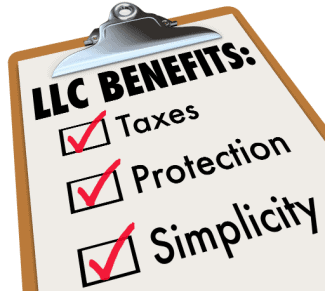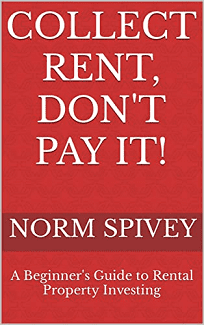To Form an LLC or Not
By Norm Spivey, Author of Collect Rent, Don’t Pay It!: A Beginner’s Guide to Rental Property Investing
Should the “amateur” real estate investor form a business, most typically a Limited Liability Corporation, or not? The short answer is yes. The benefits of doing business as an LLC far outweigh the additional costs and administrative burden for a number of reasons. Perhaps most importantly, for tax purposes, the profits from any real estate assets held in an LLC are handled as personal passive income just like any other real estate investment. This avoids the sometimes-complicated corporate taxes of an S Corporation or other business entity.

Some investors take this level of protection to the extreme and will form a separate LLC or a “serial” LLC for every property they own. This would incur some substantial attorney and business tax fees (all of which should be deductible) not to mention a lot of additional paperwork to maintain. But this strategy would offer the owner maximum protection of their personal assets. I am not 100% convinced forming an LLC for every asset solely for the additional layer of liability protection is absolutely necessary. A good rental property owner’s insurance policy should provide a reasonable layer of protection.
I believe there are more compelling reasons for the amateur real estate investor to form an LLC. For my spouse and I, doing business as a business rather than as individuals was the number one reason, we formed an LLC. An LLC will enable the real estate investor to establish an Employer Identification Number or EIN, business bank accounts, business credit cards and generally do all business-related matters in the name of the LLC rather than in the investor’s own name.
This adds that layer of separation between an investor’s personal finances and their business dealings. We established bank accounts, credit cards, PO Box, email accounts, google phone accounts etc… all in the name of our LLC. We don’t use our personal emails, phones or of course mailing address in any of our business dealings. Although I am sure our personal information would be easy enough to find, it would require someone to actually go through the effort rather than just handing them the information.
As mentioned, the great thing about an LLC is that for tax purposes, income generated from the rental properties is just counted as regular individual passive income. No need to mess around with any of the corporate tax mess! With an LLC, the real estate investor gets to enjoy the perks of being a business owner without the complicated taxes.
I was amazed at some of the opportunities available to businesses. There are many resources for creative financing of new investments! Additionally, many business accounts and credit cards come with perks. I’ll briefly share one of my favorite life hacks we use both with our business accounts and personal credit card that has brought our family joy.
We put every single purchase on our business credit card and then pay it off every month. When I say every single purchase, I mean every single purchase. From a gallon of paint, plumbing repairs, utility bill payments, property taxes, anything that a vendor will let us charge on a card. I will usually pay the convenience fees for purchases if not too outrageous. Sometimes these convenience fees may be deductible but be sure to double check with a tax professional. As a result, our rewards points stack up quickly.
If executed correctly, this financial tactic is a fun little life hack that could reward the hard-working real estate investor every year either in travel benefits or cash. We’ve paid for some nice family vacations using points acquired from our rental property business. Also, paying off the card balance in its entirety every month reflects well on credit scores over time. I can’t stress enough, paying off the bill every month is key for this little tactic to work!
We didn’t establish an LLC until about eight years into our rental property investment journey. There are legal fees required to establish an LLC and payment of annual business privilege taxes to maintain the entity (usually tax deductible). Despite the additional costs, moving our real estate investment business to an LLC was a perfect fit for us.
Important to remember, there is no requirement for the real estate investor to form a business. In theory, an individual could own 100 rental properties in their own name and claim the passive income on their individual return for tax purposes. Consider the pros and cons to determine if establishing an LLC for real estate investments is the right move for your personal situation. It certainly was for us!
About the Author

















 Accessibility
Accessibility